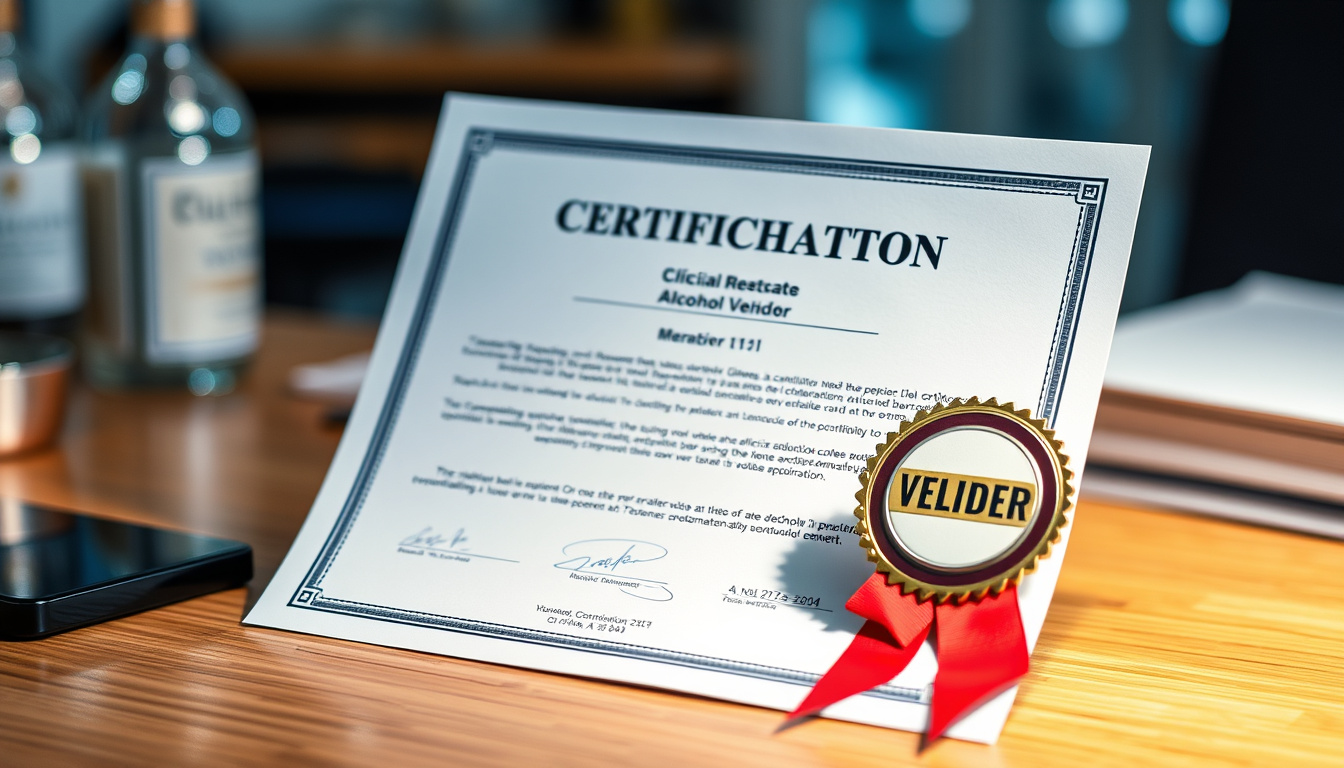
BLOG
If you plan to serve alcohol at your place, get a permit. This permit keeps your business legal and stops problems with state and local laws. It helps you run your operations in a straight, simple way. In this guide, we show you the steps to get your permit. We list the process, the rules, and tips to keep things smooth.
Understanding What an Alcohol Service Permit Is
An alcohol service permit lets you sell, serve, or share alcohol in a legal way. State or local officials issue this permit. Restaurants, bars, clubs, hotels, and similar places need it. Without the permit, selling alcohol breaks the law. You could face fines, legal trouble, or even close your business.
The rules and steps to apply can change by state or town. They normally make you show your skills, pass checks, and pay fees.
Why You Need an Alcohol Service Permit
You get many benefits from a permit:
- Legal compliance: You work within the law. This cuts the risk of fines or shutdowns.
- Responsible alcohol service: Many permits ask for proper training. This keeps you safe and lowers risks.
- Enhanced reputation: Customers trust a licensed place more. Trust helps boost sales.
- Operational flexibility: With a permit, you can add services like a bar or special events.
Because of these reasons, if you plan to serve alcohol, getting a permit is a must.
Step-by-Step Guide to Obtaining an Alcohol Service Permit
Here is how you can get your alcohol service permit using clear, step-by-step guidance:
1. Research Local and State Requirements
Start by searching your local and state laws about alcohol permits. Look for the official agency, like the Alcoholic Beverage Control or ABC board. Your state may have separate permits for beer, wine, spirits, or all types.
2. Determine the Type of Permit You Need
Decide which permit suits your business. Choose one of these options:
- On-premises consumption permits (for bars and restaurants)
- Off-premises consumption permits (for liquor stores)
- Special event permits (for fairs or temporary events)
Apply for the type that fits your need.
3. Complete the Application Form
Fill in the permit form. You can do this online or in person. You will list:
- Business name, address, and contact info
- Ownership details and background info
- Details about your premises and a floor plan
- Proof that your area meets zoning rules
4. Submit Necessary Documentation
Send the needed documents with your form. These may include:
- Proof of business registration or incorporation
- Tax details and employer identification number (EIN)
- Insurance papers
- Evidence of responsible alcohol service training
- Local health and safety permits
5. Pass Background Checks and Inspections
Officials check the background of the owners and key staff. They also inspect your place for safety, zoning, and health compliance.

6. Pay Permit Fees
A permit costs money. The fees vary from a few hundred to thousands of dollars. Pay the fees for application, processing, and renewal on time.
7. Wait for Permit Approval
Your permit takes time to be approved. This might be a few weeks to a couple of months. During this wait, officials review your form, check your place, and verify your background.
8. Display Your Permit
Once approved, post your permit clearly on your premises as required by the law.
Tips to Simplify the Alcohol Service Permit Process
The permit process might seem hard. Follow these tips to keep it simple:
- Start early: Begin well before you need to serve alcohol.
- Stay organized: Keep your forms and documents in order.
- Consult professionals: Ask legal or licensing experts if you are unsure about any rules.
- Do the training: Many places require responsible alcohol service training. Finish this step early.
- Double-check your form: Make sure every part is complete and correct.
Common Challenges and How to Avoid Them
There are a few common issues when applying for a permit:
- Incorrect applications: Incomplete or wrong forms delay the process.
- Zoning issues: Check that your location is allowed to sell alcohol.
- Missing training: Many rules need proof of responsible service training.
- Late payments: Delays can lead to suspension or cancellation.
Follow all steps and rules closely to avoid these issues.
Sample Checklist for Alcohol Service Permit Application
Below is a checklist to help you manage the process:
- [ ] Completed permit application form
- [ ] Business registration and federal EIN
- [ ] Proof of premises ownership or lease agreement
- [ ] Floor plan of your place
- [ ] Responsible Alcohol Service Training certificates
- [ ] Local health and safety permits
- [ ] Background check consent forms
- [ ] Payment for application and fees
Frequently Asked Questions (FAQ)
Q1: How long does it take to get an alcohol service permit?
A1: Processing times vary from 30 to 90 days, based on your state’s rules and how complete your application is.
Q2: Can I serve alcohol without an alcohol service permit?
A2: No. Serving alcohol without a permit is illegal and can lead to fines, legal issues, or closure.
Q3: What is required for responsible alcohol service training?
A3: Many states need owners or staff to finish a certified alcohol awareness course. This course covers how to spot intoxication and stop underage drinking.
Conclusion
Getting an alcohol service permit is key if you want to add alcohol to your services. Research the rules, prepare your documents, and work through each step. This careful approach protects your business and promotes safe, legal alcohol service.
For more details or to start your application, check your local alcohol control board or visit trusted government websites such as the U.S. Alcohol and Tobacco Tax and Trade Bureau (TTB).
Start the process today. Get your permit and serve your community with care!

BLOG
When it comes to pet care, keep your pet happy and healthy. Choose the best caregiver for your furry friend. An LSB-RVT provider gives special animal care. These experts are licensed by the state as Registered Veterinary Technicians (RVTs). They work carefully and kindly at every visit to help your pet.
In this article, we list the top benefits of choosing an LSB-RVT provider. Whether you need a routine checkup, an emergency fix, or special treatment, knowing these benefits can guide your pet care choices.
What Is an LSB-RVT Provider?
First, let us explain the term LSB-RVT provider. LSB stands for Louisiana State Board. This board licenses veterinary technicians who have met education and exam standards. An RVT is a trained professional who works closely with veterinarians on animal care.
When you choose an LSB-RVT provider, you work with a licensed expert. This expert meets strict rules and offers high care standards for your pet.
Benefits of Choosing an LSB-RVT Provider
1. Expert and Specialized Animal Care
LSB-RVT providers train hard and earn their certification. They learn animal anatomy, medicine, anesthesia, lab tests, and more. Their study helps them run tests, give medicine, and watch over your pet’s health.
Because they know their subject well, LSB-RVTs spot small changes in your pet’s condition. They act fast, and early help can lead to better results.
2. High Level of Professional Accountability
Choosing an LSB-RVT provider means trusting someone with high ethics and professional rules. The Louisiana State Board sets these rules. They require ongoing learning and may discipline those who do not meet the standard.
This system builds trust. You know your pet is cared for by someone who is both knowledgeable and responsible.
3. Enhanced Communication and Client Education
A major benefit of LSB-RVT providers is their focus on sharing clear information. Veterinary technicians talk with pet owners. They explain how to care for your pet, answer your questions, and give clear aftercare advice.
They help bridge the gap between the veterinarian and the pet owner. This makes the care process easier to understand.
4. Compassionate and Personalized Care
Many pet owners say LSB-RVT providers show true compassion. They treat every pet as a unique being with special needs and fears. They work to create a calm space that reduces stress and makes visits easier.

They design care plans that fit your pet’s unique needs and aim to keep your pet as healthy as possible.
5. Cost-Effective and Efficient Services
Even though veterinarians lead care, LSB-RVT providers do many tasks. They make the care process simpler and often lower the overall cost. Some services by an RVT may avoid extra trips to the clinic.
This efficiency benefits the clinic and gives you a more convenient, affordable option.
6. Access to Advanced Procedures and Techniques
LSB-RVT providers learn advanced methods like anesthesia monitoring, dental care, lab testing, and imaging. Their skills help veterinarians offer up-to-date care.
By choosing an LSB-RVT provider, your pet gets the best in modern veterinary care.
When Should You Consider Consulting an LSB-RVT Provider?
- For regular checkups and vaccines
- When your pet needs tests like blood work or urine analysis
- Before and after surgery to watch over care
- When your pet needs special nursing or rehab
- For advice on behavior and nutrition
- In emergencies or sudden illness with vet guidance
LSB-RVT providers work with veterinarians. They are often the first to care for your pet in its health journey.
How to Find a Qualified LSB-RVT Provider
When you look for a good LSB-RVT provider, follow these steps:
- Check Licensing: Make sure the technician is licensed by the Louisiana State Board.
- Ask for Credentials: Look for RVTs who have training in areas that suit your pet’s needs.
- Seek Reviews and Recommendations: Ask your veterinarian or pet community for advice.
- Visit the Clinic: Confirm that the clinic is clean, modern, and has friendly staff.
- Evaluate Communication: Choose providers who explain things clearly and show empathy.
The American Veterinary Medical Association (AVMA) also offers resources to find certified veterinary technicians.
FAQ About LSB-RVT Providers
Q1: What specific services do LSB-RVT providers offer?
A1: They do diagnostic tests, give medicines, help in surgeries, monitor anesthesia, clean teeth, and explain care procedures to pet owners.
Q2: How is an LSB-RVT provider different from a veterinarian?
A2: Veterinarians diagnose illnesses and prescribe treatments. LSB-RVT providers work under veterinarians. They are trained technicians who assist in care.
Q3: Can LSB-RVT providers handle emergencies?
A3: Yes, they are trained to help in emergencies and to monitor care during urgent cases.
Conclusion
Choosing an LSB-RVT provider for your pet means you get expert, kind care. These licensed professionals work with veterinarians to ensure your pet gets complete and personalized services.
When you choose an LSB-RVT provider, you invest in your pet’s health and joy. Rely on their training and care to keep your animal friend healthy and thriving.

BLOG
If you plan to work in a place that serves drinks, you need an alcohol server permit. This permit shows you understand the law about serving alcohol. It also helps you serve with care. Follow this clear guide to get your permit fast so you are set to work.
What is an Alcohol Server Permit?
An alcohol server permit is a simple certificate. It tells you may serve drinks in bars, restaurants, or other licensed spots. It teaches you the laws on alcohol service. It stops underage drinking and keeps overserving low. States and local rules often require the certificate for bartenders, waiters, and others who serve alcohol.
Step 1: Check Your State or Local Requirements
Before you start, check your state or local rules. State law or local boards set these rules. You can visit your state’s Alcohol Beverage Control (ABC) website or your local government site. Look up the permit or training rules for serving alcohol. Note which training programs are accepted and the permit’s valid time.
For example, California needs Responsible Beverage Service (RBS) training. Texas requires TABC certification.
Step 2: Enroll in an Approved Alcohol Server Training Program
Most states need you to finish a training course before you apply for the permit. In these courses you learn to check IDs, spot signs of intoxication, know the law, and manage tough situations by refusing service. Many courses are online, so you can learn at your own pace. Choose a course that your state’s ABC website lists to be sure the course is accepted.
Benefits of online training:
- You set your schedule.
- Lessons are clear and engaging.
- You get a certificate immediately after the test.
Step 3: Complete the Training and Pass Any Required Tests
After you enroll, work through the course step by step. When you finish the lessons, you will take a test. This test checks that you understand what you learned.

Tips to succeed:
- Take clear notes during the course.
- Read the material again.
- Retake practice quizzes if you need to.
When you pass the test, you earn a certificate. This certificate is a key part of your permit application.
Step 4: Submit Your Application for the Alcohol Server Permit
When you have your certificate, fill out an application for the permit. You might complete the form online or in person. You must show your training certificate and pay a fee. Some states let your employer manage this step, so ask your future boss if needed.
Step 5: Receive and Carry Your Alcohol Server Permit
After your application is approved, you get your permit. You may receive a card, a digital file, or both. Keep the permit with you at work, as your boss or inspectors may ask for it. Your permit will have an expiry date, so set a reminder to renew it on time.
Tips for Maintaining Your Alcohol Server Permit
- Stay updated with changes in alcohol laws.
- Attend refresher courses if the state asks for them.
- Serve alcohol responsibly to protect your permit.
- Replace a lost or stolen permit quickly by contacting the issuing authority.
Common Mistakes to Avoid
When you apply for or use your permit, avoid these errors:
- Pick only approved training providers.
- Miss no renewal deadlines.
- Forget to carry the permit during your shift.
- Overlook state-specific rules that may differ from general guidelines.
Benefits of Having an Alcohol Server Permit
Getting an alcohol server permit gives you many benefits:
- Legal compliance: It keeps you and your employer safe from fines.
- Enhanced knowledge: You learn to handle tough situations.
- Job marketability: Many employers prefer certified servers.
- Increased confidence: You serve customers with clear responsibility.
FAQ About Alcohol Server Permits
Q1: How long does it take to get an alcohol server permit?
The time varies by state and by whether you take an online or in-person course. Usually, you can finish training and get the permit in a few days to a couple of weeks.
Q2: Can I serve alcohol without an alcohol server permit?
In most states, you cannot. Serving without the permit may lead to fines, job loss, or legal issues.
Q3: Is the alcohol server permit transferable between states?
Usually, no. Each state sets its own rules. Often, you must get a new permit if you move or work in another state.
Conclusion
Getting your alcohol server permit is simple. Read your state’s rules, enroll in a proper training course, pass the test, and apply for the permit. Soon, you will work in hospitality in a safe and legal way. For up-to-date info, check your state’s Alcohol Beverage Control authority website. With this clear guide and by serving responsibly, you will earn your permit quickly. Cheers to your success!

BLOG
Obtaining alcohol vendor certification is a key step. It helps you sell or distribute alcohol. You may open a new bar, run a liquor store, or serve at events. This certification makes sure you meet legal rules. It also guides you to act responsibly. This guide explains the process, benefits, and how to follow state and local rules.
What Is Alcohol Vendor Certification?
Alcohol vendor certification shows you have trained. It proves you met the required standards set by regulators. You earn the right to sell alcohol legally. The certification stops underage drinking and intoxication. Certified vendors know alcohol laws. They use proper serving skills. They follow health and safety rules.
Why Is Alcohol Vendor Certification Important?
Alcohol vendor certification is very important. It stops legal penalties and fines. It also supports safe alcohol use in communities. Certified vendors can:
- Check customer age to stop underage sales
- Spot signs of intoxication and refuse service
- Understand alcohol law rules deeply
- Lessen business liability risks
In many states, you must get this certification to get or renew your liquor license. It also shields you from lawsuits and strict enforcement.
Step-by-Step Guide to Obtaining Alcohol Vendor Certification
1. Determine Your State’s Requirements
First, learn your state’s rules. Each state or area can have different needs. Check your state’s Alcohol Beverage Control (ABC) website. Some states require all staff to get certified. Others need only managers or main sellers.
2. Choose an Approved Certification Program
Next, pick a proper training program. Programs are online, in person, or hybrid. Choose one that your state recognizes. The course should cover:
- Legal duties and penalties for breaking rules
- Steps for age verification
- Ways to handle intoxicated customers
- Best practices for customer service
Popular providers include TIPS and ServSafe Alcohol. Check which programs suit your area.
3. Complete the Training Course
Now, take the training course. You may spend a few hours to a full day learning. Read each module well. Answer quizzes and work through practice scenarios. These steps prepare you for real situations.
4. Pass the Certification Exam
After training, you must pass an exam. The exam may be multiple choice or need written answers. Passing the exam will give you the certification. Review the material and you should do well.
5. Receive Your Certification
Once you pass, you get an official certificate. Sometimes you get it immediately by email; other times, it arrives by mail.
6. Submit Your Certification to the Appropriate Authority
Often, you must send proof of your certification to your local alcohol board. This step helps complete your license process. Keep a copy of your certificate.
7. Stay Current With Recertification
Alcohol laws change over time. Many states ask vendors to recertify every 1 to 3 years. Mark your calendar for these deadlines. This keeps you legal and updated.
Essential Tips for Successful Alcohol Vendor Certification
Here are some tips to succeed:
- Start early before you need the license or job.
- Choose well-reviewed and accredited training providers.
- Write down key points during training.
- Practice with role-play or practical exercises.
- Keep your certificate in a safe, easy-to-find spot.
Benefits of Alcohol Vendor Certification for Your Business
The certification gives more benefits than just legal compliance:
- It boosts your business’s professionalism and reputation.
- It lowers the risk of legal problems or suspensions.
- It creates a safer space for customers and staff.
- It builds trust with suppliers, vendors, and your community.
Investing in certified training shows your commitment to responsible alcohol sales. This can also improve customer satisfaction and loyalty.

Common Challenges and How to Overcome Them
Sometimes, you face challenges in the certification process. Some vendors have issues with language, timing, or complex legal language. Try these ideas:
- Look for training in multiple languages.
- Pick flexible online courses.
- Use extra study tools like videos and quizzes.
- Form a study group with peers.
FAQs About Alcohol Vendor Certification
1. What is the difference between alcohol vendor certification and a liquor license?
Alcohol vendor certification is a training step for individuals who sell alcohol. A liquor license is a legal permit for a business to sell alcohol. Often, you need certification before a liquor license is granted.
2. How long does alcohol vendor certification last?
The certification period changes by state. It usually lasts between 1 and 3 years. After it expires, you must take a refresher course.
3. Can I complete alcohol vendor certification online?
Yes, many states allow online certification. Online courses give you flexibility. Just make sure the program is recognized by your local authority.
Conclusion
Getting your alcohol vendor certification is critical for selling alcohol legally and responsibly. Learn your state’s rules, choose a certified program, and finish the course and exam. Your dedication helps you follow the law and serve your community safely. Remember to recertify when needed. For more details, visit your state’s Alcohol Beverage Control website or check industry leaders like the National Institute on Alcohol Abuse and Alcoholism.
Invest in your professional growth today by earning your alcohol vendor certification. It benefits your business, your customers, and your community.

BLOG
Renew your LSB-RVT certificate. This step keeps you recognized as a Registered Veterinary Technician (RVT) by the Louisiana State Board of Veterinary Medicine (LSB). Stay compliant, avoid gaps, and keep practicing without worry. This guide explains the LSB-RVT renewal process. It links application dates, continuing education, and all you need for renewal.
Understanding the LSB-RVT Renewal Process
The LSB-RVT renewal process lets Louisiana RVTs revalidate their certificate. The Louisiana State Board of Veterinary Medicine requires renewal every two years. Renew on time to stop penalties, fines, or the need to reapply. Renewal is more than a form submission. It shows your professional development, confirms fee payment, and meets all requirements.
Who Needs to Renew?
Every veterinary technician with LSB-RVT must renew every two years. The board sends a reminder, but tracking your dates is up to you.
Important Deadlines and Fees for LSB-RVT Renewal
Missing your deadline can bring late fees or even suspension. Here are the key details:
- Renewal Period: The board opens renewal 60 days before your license expires.
- License Expiration Date: Licenses end on August 31 of even years, every two years.
- Renewal Fee: The fee is $65 now. Always check the board website for updates.
- Late Renewal Penalty: A 30-day grace period exists. After that, a late fee applies.
Mark your calendar and submit before August 31. ## Step-by-Step Guide to Complete Your LSB-RVT Renewal
Renewal is simple with these clear steps:
- Check Your Eligibility: Make sure your license is active. Resolve any disciplinary or fee issues.
- Complete Continuing Education (CE) Hours: Earn at least 20 hours of approved CE over two years.
- 10 hours must come from board-approved sources.
- The remaining hours may come from other recognized providers.
- Prepare Documentation: Gather CE records, certificates, and other proof.
- Access the Renewal Portal: Visit the official board website and log into your account.
- Fill Out the Renewal Form: Enter all required information accurately.
- Pay the Renewal Fee: Use a credit card or send a check/money order as instructed.
- Submit Your Application: Review your details and send your application before the deadline.
You will get an email confirmation. Keep that receipt safe.
The Role of Continuing Education in LSB-RVT Renewal
Continuing education (CE) makes sure you stay current with veterinary practices and rules. CE is a key part of renewal.
Tips for Choosing Approved CE Courses
- Check that your course provider is approved by the board.
- Save your certificates as proof.
- Use online options for convenience.
- Select courses that match your specialty or help you grow in new areas.
The board lists approved providers on their website. Using these courses means your hours count.

Common Renewal Mistakes to Avoid
Avoid these common errors to keep your renewal smooth:
- Waiting Until the Last Minute: Renew early to dodge website traffic or technical problems.
- Inaccurate Application Information: Check your details for mistakes.
- Incomplete CE Hours: Begin your courses early; don’t delay.
- Ignoring Email Notifications: Read all emails for important updates.
- Unpaid Previous Fees or Fines: Pay these before you renew.
These tips help you keep your license active.
What Happens if You Miss Your LSB-RVT Renewal Deadline?
Missing the August 31 renewal deadline is serious. You might renew within a 30-day grace period by paying a late fee. If you miss this period, your license may be suspended or revoked. Reinstatement may require a new application, extra fees, and proof of competency.
Plan ahead to avoid these problems.
How to Check Your LSB-RVT License Status
Check your status on the board’s online license lookup. This tool shows if your license is current, expired, or under review. Regular checks help you avoid surprises.
Summary: Key Tips for a Successful LSB-RVT Renewal
Renewing your LSB-RVT license is a key duty for Louisiana RVTs. Here are the main points:
- Begin renewal 60 days before your license expires.
- Complete 20 hours of approved CE.
- Keep your CE certificates organized.
- Submit accurate details through the board’s renewal portal.
- Pay the $65 fee before August 31.
- Check your license status regularly.
- Resolve any disciplinary or fee issues fast.
- Follow the board’s emails to stay informed.
Frequently Asked Questions About LSB-RVT Renewal
Q1: How many continuing education hours do I need?
A1: You need 20 hours of approved CE every two years for renewal.
Q2: Can I apply for renewal after my license expires?
A2: Yes, within a 30-day grace period you can renew with a late fee. After that, you may face suspension or need to reapply.
Q3: Where can I find approved CE providers?
A3: The board lists approved CE providers on their website. Use these to ensure your hours are counted.
Resources for More Information
For updates, instructions, and the renewal portal, visit the Louisiana State Board of Veterinary Medicine:
Louisiana State Board of Veterinary Medicine
Renewing your LSB-RVT license may seem hard, but clear steps and preparation make it smooth. Use this guide to stay current and keep your veterinary career strong.










